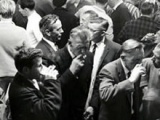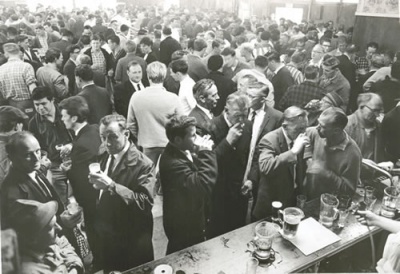Events In History
-
 9 October 1967The end of the 'six o'clock swill'
9 October 1967The end of the 'six o'clock swill'Six p.m. closing for pubs was introduced as a 'temporary' wartime measure in 1917. The resulting 'six-o'clock swill' encouraged binge drinking as patrons tried to drink their fill before closing time. Read more...
-
 2 December 1917'Six o'clock swill' begins
2 December 1917'Six o'clock swill' beginsSix p.m. closing of pubs was introduced as a 'temporary' wartime measure. It ushered in what became known as the 'six o'clock swill', in which patrons drank their fill before closing time. The practice was to last for 50 years. Read more...
Articles
Food in the 20th century

The pavlova - that frothy, baked confection of egg whites and sugar - has long been seen as an icon of New Zealand cuisine; its place of origin has been debated with Australians for just as long in one of the many instances of trans-Tasman rivalry.
- Page 2 - Dining outBefore the 1960s, New Zealanders had a limited choice both of venue and of food if they wanted to dine
1947 Greymouth beer boycott

What would it take for West Coasters to boycott their beloved beer? Greymouth hotel-keepers found out in 1947, when an organised attempt to raise the price of beer sparked one of the most effective consumer boycotts ever seen in New Zealand.
- Page 2 - Pub cultureBetween 1919 and 1967 all public hotels in New Zealand officially closed at 6 p.m., but these hours were only nominally observed on the West Coast.
Assisted immigration, 1947-75

New Zealand is a country of immigrants. Wave after wave of peoples have settled here: Polynesian, British, European, Asian.
- Page 5 - Life in New ZealandAfter they arrived, each assisted immigrant was given a letter of welcome from Bert Bockett, the Secretary for Labour, which outlined the assistance which the Department would
Temperance movement

Temperance was one of the most divisive social issues in late-19th and early-20th century New Zealand. Social reformers who argued that alcohol fuelled poverty, ill health, crime and immorality nearly achieved national prohibition in a series of hotly contested referendums.
- Page 4 - Voting for prohibitionThe First World War period brought total or partial prohibition to several countries: New Zealand came within a whisker of joining
Armistice Day

After four terrible years, the First World War finally came to a close with the signing of an armistice between Germany and the Allied Powers on 11 November 1918. New Zealanders celebrated enthusiastically, despite having recently celebrated the surrenders of the three other Central Powers and the premature news of an armistice with Germany.
- Page 7 - New Zealand in 1918Some facts and stats about New Zealand in the year of the First World War
-
Main image: New Zealand pub scene, 1967
The 'six o'clock swill' at the Porirua Tavern in 1967

